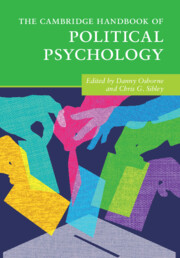Book contents
- The Cambridge Handbook of Political Psychology
- The Cambridge Handbook of Political Psychology
- Copyright page
- Dedication
- Contents
- Figures
- Tables
- Contributors
- Part I Foundations of Political Psychology
- Part II The Politics of Intergroup Attitudes
- Part III Contemporary Challenges to Democracy
- Part IV Diversifying Perspectives in Political Psychology
- 37 Political Psychology in the Global South
- 38 Political Psychology in the Arab Region
- 39 Critical Perspectives in Political Psychology
- 40 Rethinking Group Dynamics
- 41 Two Sides of the Same Coin
- Index
- References
40 - Rethinking Group Dynamics
The Cuban Missile Crisis Revisited
from Part IV - Diversifying Perspectives in Political Psychology
Published online by Cambridge University Press: 17 February 2022
- The Cambridge Handbook of Political Psychology
- The Cambridge Handbook of Political Psychology
- Copyright page
- Dedication
- Contents
- Figures
- Tables
- Contributors
- Part I Foundations of Political Psychology
- Part II The Politics of Intergroup Attitudes
- Part III Contemporary Challenges to Democracy
- Part IV Diversifying Perspectives in Political Psychology
- 37 Political Psychology in the Global South
- 38 Political Psychology in the Arab Region
- 39 Critical Perspectives in Political Psychology
- 40 Rethinking Group Dynamics
- 41 Two Sides of the Same Coin
- Index
- References
Summary
What is the essence of group decision-making? How does group dynamics affect policy outcomes? This chapter contributes to foreign policy analysis and national security decision-making by advancing a comparative group dynamic perspective. Specifically, we examine three models of group decision-making: Groupthink, Polythink, and Con-Div, and apply each model to the Kennedy administration’s decision to impose a naval blockade during the Cuban Missile Crisis. We claim that applying different group decision-making models to real-world cases presents a new way of explaining governmental decisions. Based on our comparative analysis of the three models, we find that the Con-Div model performs best in explaining the naval blockade decision.
Information
- Type
- Chapter
- Information
- The Cambridge Handbook of Political Psychology , pp. 656 - 673Publisher: Cambridge University PressPrint publication year: 2022
